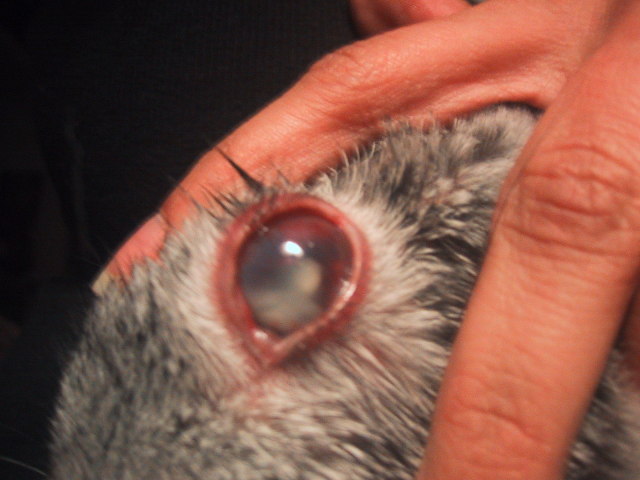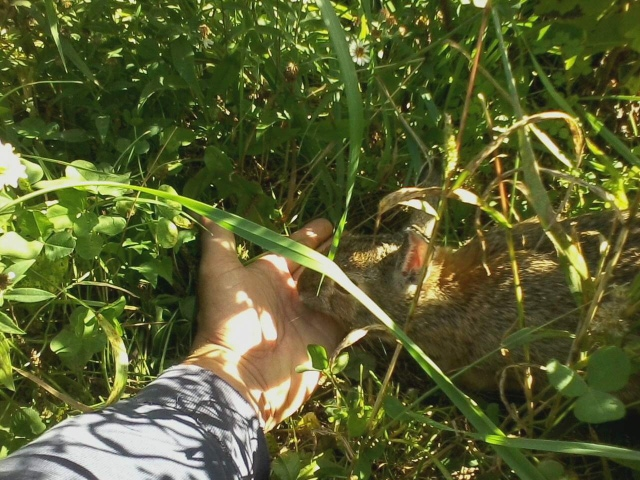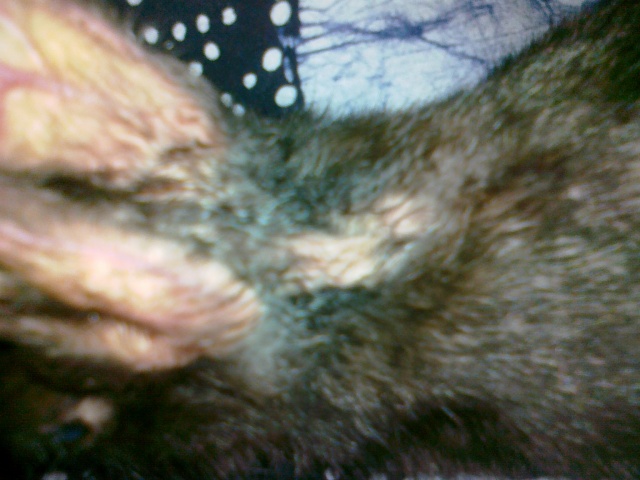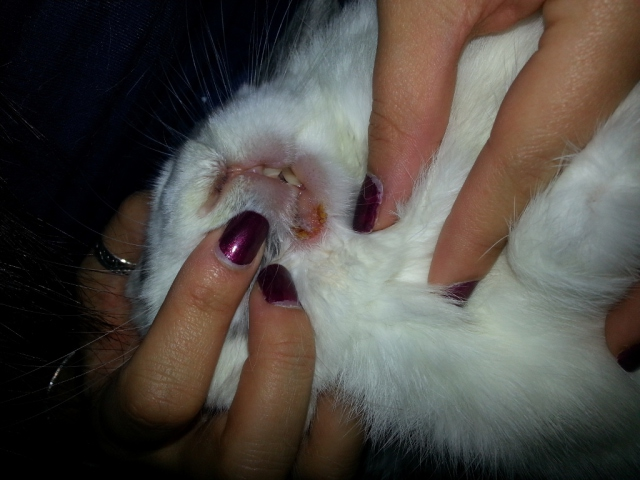QuestionQUESTION: Dear Dana,
I wrote to you last week about Ted (8-9 year old, probably e. cuniculi, hind leg paresis, GI and dental problems).
Ted has been to the vet again (!) because his mobility got so much worse after 3 weeks on Panacur. (My vet is a rabbit expert and seems very knowledgeable.) On this last visit Ted got a vitamin B injection, had some fur trimmed and Rearguard (against flystrike) applied. I asked about Ponazuril but the vet couldn't find it in his formulary. I have since discovered it is available as Baycox in this country. We were also given some tetracycline tablets but I have only given 2 or 3 doses, I can't get them in him at the moment - he won't even eat banana now. We decided not to do an x-ray or another blood test because the vet said that nothing could be done anyway, e.g. he couldn't have a back operation at his age and in his condition.
After the last 3-4 visits Ted has been in very bad shape, looking like he was going into GI stasis. Perhaps he can't deal with the stress anymore.
So, at the moment I am desperately trying to keep him going (trying to get him to drink, metoclopramide, zantac, metacam, trying to get him to eat a few herb leaves, etc.) but it doesn't look like he's going to get through it this time. I haven't done any force feeding because he is still eating a little bit and it would be terribly stressful.
I nursed him for weeks after he had a gastrotomy 15 months ago (and it didn't look like he would survive) and it has been a struggle on and off since then.
I give him a bath every night because he can't get up to pee and is constantly wet. The vet said that if we can't prevent urine scald and bedsores I am going to have to let him go.
Ted still purrs when I massage his back but he hates all the fuss of drying and moving him and it is heart breaking to see him struggle to move himself when he can't. He just cannot get on his feet anymore.
I don't believe his mobility will improve. I have read that rabbits can lead happy lives even in this state but Ted seems pretty miserable especially when we have to force medicine in or dry him. It's all terribly stressful for both of us. How do I know whether it is right to end his life?
Thanks yet again for your help. Much appreciated.
Diane
ANSWER: Dear Diane,
This is a question only you and Ted can answer. I will tell you, though, that all of the disabled rabbits I've lived with have gone through a period of frustration while they adjust to their new lack of mobility. Same for humans. But we don't euthanize just because a wheelchair is now the mode of transport.
A bunny who can't walk can live a perfectly happy life with the right care. Urine scald can be avoided with a good, cushioned bed of artificial fleece that wicks away moisture, such as those from Palace Pet:
http://www.palacepet.com
If bunny urinates on himself, a little daily rinse/shampoo just on the bum/affected area then blown dry on warm (not hot) can keep him very comfortable. We've had bunnies live for years this way, and once they adjust they are just happy as clams to have their treats brought to them. It's especially good if the bunny has a bunny pal to groom and cuddle. (We've bonded disabled rabbits with each other and it was absolutely adorable.)
Please see these articles for help and hope:
http://search.atomz.com/search/?sp-a=00062824-sp00000000&sp-q=disabled
I hope this helps you make the right decisions.
Dana
---------- FOLLOW-UP ----------
QUESTION: Dear Dana,
Thank you for your answer. To my great distress and after long hours of agonising Ted was euthanized on Friday afternoon. Although the vet said it was the kindest thing to do (it was not just an immobility issue, Ted had lost interest in eating and drinking, he had dental and digestion problems, looked very uncomfortable and his body was contorted, he was developing additional infections, ...) I feel incredibly guilty thinking maybe I should have tried harder for longer or maybe I should have ended Ted's life earlier. I cannot describe how much I miss him.
My house is unbearably empty now and I have been thinking about giving one or two other rescue bunnies a home. I am of course very anxious to try and avoid this dreadful e. cuniculi disease. We have steam cleaned the floor. The vet advised us that the current protocol in the UK is to treat all newly adopted rabbits with a 28 day course of Panacur. Does that really eliminate the parasite? Is there anything else we should do?
Best wishes,
Diane
ANSWER: Dear Diane,
I am so very sorry about the loss of Ted. Please rest assured that you did all you could. If he was not eating or drinking and in so much discomfort, I don't think anything else you might do could have helped. He is not in pain now.
You are wonderful to want to help more bunnies. Ted would be pleased. :)
I would not worry too much about E. cuniculi. Rabbits usually contract the parasite when very young (often from the mother), and though it's not known how many rabbits have E. cuniculi, it's clear that many of them have it all their lives and never show any signs of infection. It depends on the immune system and how well the body manages the parasite.
If your place is well cleaned, there should be little to no danger of transmission. The cysts are apparently transmitted via urine, but only in the first 2-3 weeks after infection. So if you thoroughly clean all areas where Ted did his business, you have done your job.
I hope you will find a bonded pair of rescue bunnies who will help you fill the emptiness in your heart with a new kind of love. No one will ever replace Ted. But the new bunnies will fill you with joy in their own unique way.
Take care,
Dana
---------- FOLLOW-UP ----------
QUESTION: Dear Dana,
Thank you so much for your kind and reassuring words. I do apologise for asking yet another question...
I visited a rescue centre today to meet a pair of bonded Dutch rabbits (8-9 months old, very delicate looking). They seemed bright, cute (especially when they were lying on top of each other), I saw them nibble a bit of hay, droppings looked good, I didn't notice any nasal or ocular discharge BUT I heard 3 sneezes in the half hour I was there.
These buns had come in on 26th May in a crowd with their parents and littermates and another litter of babies (!) and apparently some of them had 'snuffles'. All were given Baytril. Apparently some of the babies didn't survive. Since then one of the pair has been given Baytril again for 3 days (sounds all wrong to me but I'm sure they're doing the best they can, the vet is probably not rabbit savvy, they rehome mainly dogs and cats).
Perhaps it's very selfish of me but I was rather hoping for healthy bunnies after the 15 month struggle with Ted's declining health. Also, I would hate to take them to the vet lots and forcing medicine in them as soon as they are here and don't know me yet. Doesn't sound like a good start of a relationship.
Do you think I am paranoid about the sneezing? Should I ask (and I suppose offer to pay, it would cost quite a bit) for culture and sensitivity testing to be done on nose swabs? If they do have 'snuffles', would that be a chronic condition? Should I just take a chance and see how they get on and perhaps take them to the vet in a few weeks as long as there is no discharge?
Thank you so much for your help!!!
Best wishes,
Diane
AnswerDear Diane,
This is a tough one. If it were me making the decision, and I was in love with these bunnies, I would not hesitate to take them. But then, I am insane, and also have a lot of experience treating bunnies with chronic problems.
Is this a chronic problem? Impossible to say. Conditions like "snuffles" (a catch-all term for upper respiratory infection that can be caused by any number of different bacteria) can be promoted by stress. And just being in a rescue situation can be stressful enough to immunocompromise these bunnies and allow pathogens to proliferate.
It's quite possible that once you got them home, well fed and in a stable, permanent environment they would become strong and well and their immune systems would take over and pummel the resident pathogens back to manageable levels.
We all carry potential pathogens in our bodies. The trick is keeping stress levels down, immune system strength up, and letting Nature do what it does.
I'm not sure I answered your question, but I hope this helps you make a decision that will be right for you.
Good luck!
Dana

 EXTREMELY concerning eye problem
QuestionTinkerbells Cloudy Ey
QUESTION: Dana,
M
EXTREMELY concerning eye problem
QuestionTinkerbells Cloudy Ey
QUESTION: Dana,
M
 Rabbit treats
QuestionFeeding Lilly
Petting Lilly
QUE
Rabbit treats
QuestionFeeding Lilly
Petting Lilly
QUE
 hair loss at neck region of a rabbit
Questionhair loss at neck
QUESTION: hi
i have a
hair loss at neck region of a rabbit
Questionhair loss at neck
QUESTION: hi
i have a
 Horny rabbit
Question
Squirty
Hello.
We have just bought an
Horny rabbit
Question
Squirty
Hello.
We have just bought an
 Scabbing around mouth/possible mouth infection?
Question
bubbles mouth
Hello,
My bun Bubbles is
Scabbing around mouth/possible mouth infection?
Question
bubbles mouth
Hello,
My bun Bubbles is